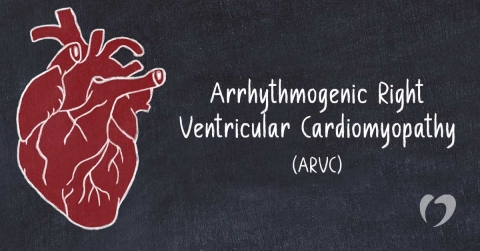Arrhythmogenic Right Ventricular Cardiomyopathy

Arrhythmogenic right ventricular cardiomyopathy (ARVC) is a genetic disease that involves a defect in the cells that hold the heart muscle together. Over time, the damaged cells are replaced by scar tissue and fat deposits. This impacts the structure of the heart muscle and interrupts the heart’s electrical system, which can result in an arrhythmia, or abnormal heart rhythm. While the name of the condition is right ventricular cardiomyopathy, the disease can also progress to the left ventricle. ARVC can lead to serious conditions, including heart block, heart failure, and sudden cardiac death.
Symptoms
ARVC often does not appear or cause symptoms until later teenage years or early adulthood. A patient with early ARVC may not have symptoms but is still at high risk from sudden death, particularly during strenuous exercise. Symptoms can be subtle initially and worsen over time as scar tissue builds in the heart. The first signs that something may be amiss include heart palpitations, fainting, and light-headedness. As the disease progresses, shortness of breath and swelling in the ankles, legs, or stomach may occur.
Causes and Diagnosis
There are a number of genetic mutations associated with ARVC, some of which are inherited from a parent and some that simply occur during the patient’s lifetime. In cases where ARVC is passed from parent to child, it typically only needs one copy of the mutation to cause the disease.
ARVC can be difficult to diagnose since the symptoms overlap with many other heart conditions and appear gradually over time. Since having a relative with ARVC raises your risk for developing symptoms, genetic counseling can be an important component of diagnosing ARVC in patients with a family history. Other tests used to diagnose ARVC may include an electrocardiogram (ECG), an ultrasound of the heart, an MRI, or an exercise test to pinpoint the cause of any symptoms.
Not every patient who carries the gene develops ARVC. If a family history and genetic testing show that an individual carries one of the mutations that causes ARVC, their doctor will monitor for any signs of the disease through regular checkups.
Treatment
While there is no cure for arrhythmogenic right ventricular cardiomyopathy, there are treatments aimed at correcting the arrhythmia and controlling the heart failure that occurs as the disease progresses. The disease has a wide range of severity, and the treatment recommended by your Oklahoma Heart Hospital physician will be based on the severity and risk of sudden cardiac death.
Although the overall risk of sudden cardiac death is not high for most patients, factors such as previous cardiac arrest, fainting episodes, or certain ECG results may indicate higher risk. Your physician may prescribe medication to help control the arrhythmia or recommend a defibrillator to help prevent sudden cardiac death. As with any medical condition, it’s important to talk with your doctor about your daily activities and any physical activity that could impact your health.
If you have experienced symptoms such as heart palpitations, fainting, or feeling lightheaded, contact Oklahoma Heart Hospital today to schedule an appointment with one of our physicians.




